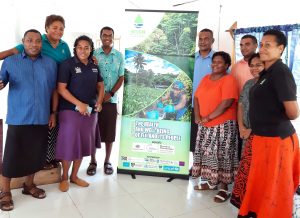

From left to right, Ponipate Baleinamau (WISH Upper Navua Catchment Coordinator), Kelera Naivalu (WISH Waibula Catchment Coordinator), Salaseini Vuibau (Health Inspector), Timoci Naivalulevu (WISH Project Manager), Viliame Nasici (Assistant Roko Tui Tailevu), Viniana Koroidavila (Ministry of Fisheries), Lepani Mauwe (Ministry of Fisheries), Ulamila Ratumainakoro (Health Inspector), Vilisi Naivalulevu (WISH Dawasamu Catchment Coordinator).
The Fiji National University’s (FNU), College of Medicine, Nursing and Health Sciences’ (CMNHS) conducted waste management, health, and sanitation training with selected villagers through the Watershed Interventions for Systems Health (WISH) Fiji project.
A multi-sectoral project, WISH is the first of its kind for Fiji, and is taking an integrated and preventative approach to benefit the health and well-being of people and their surroundings and aims to address infectious diseases through ecological interventions in Fiji.
The research project is funded primarily by the Australian Department of Foreign Affairs and Trade’s Indo-Pacific Centre for Health Security. The funding was secured in 2018 by the University of Sydney, which has partnered with FNU in the delivery of this project.
WISH Project Manager Timoci Naivalulevu said the three-day training at the Nataleira Eco Lodge consisted of about 70 participants from Matacula, Matacaucau, Navunisole, Nakorovou, Davetalevu, Nakalawaca and Deepwater settlements from the Namalata district.
“From the Dawasamu sub-catchment, participants included villagers from Qelekuro, Luvunavuaka, Nabualau, Delakado, Natadradave, Vorovoro, Nasinu and Silana,” Naivalulevu said.
“The training aimed to involve these villagers in interactive discussions that addressed the link between the spread of diseases prevalent within communities at present and how proper sanitation, health awareness and waste management practices can help prevent these.
“These are diseases such as leptospirosis, typhoid and dengue fever.”
“Through joint stakeholder training also included agencies such as the ministries of agriculture, health, fisheries, forestry and iTaukei affairs as well as the Tailevu Provincial Council, Water Authority of Fiji and the Department of Water and Sewerage.”
Naivalulevu added that action plans relevant to the villagers’ respective communities were developed and linked to their Integrated Village Development Plan (IVDP).
“To ensure that the information discussed at the training would reach various sectors of the community, we also ensured that participants included village headmen, district representatives, youth leaders, village nurses and women’s groups’ representatives,” he said.